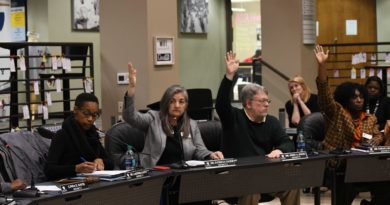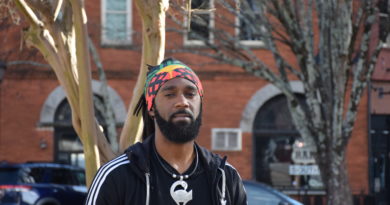Q&A with author Alex Gino
The University of Georgia held the annual Georgia Conference on Children’s Literature March 18-19. Alex Gino, a children’s book author from Staten Island in New York City, was among the keynote speakers. Gino’s first book, “Melissa”, received various recognitions including the Stonewall Award from the American Library Association. Since its publication in 2014, “Melissa” has been among the top 10 most challenged books in the U.S. Gino also wrote “You don’t know everything,” “Jilly P,” “Rick” and “Alice Austen Lived Here.” Gino identifies as genderqueer and writes stories primarily about LGBTQIA+ characters navigating school, friendship and growing up.
Co-Editor-in-Chief Jackie Wright: Could you tell me about the time when you were first able to find yourself represented in literature?
Alex Gino: The first time that I really made sense of myself was when I was 19. I was reading a book called “Gender Outlaw: On Men, Women and the Rest of Us” by Kate Bornstein, and no one had ever let that be an option before. Once I had the language, it was very easy to connect it to myself. But without the language, I just felt abstractly different.
JW: You also talked in your keynote speech about queer literature being absent at the middle school level. Could you say why it’s important, especially for middle schoolers?
AG: Middle school is a time when we’re really starting to figure out who we are as people, and how we interact with the world when we have more agency to make decisions. If you’re 5 years old, there’s only so much leeway for what you have control over. But when you’re 10, 12 years old, you’re developing friendships and connections that are distinct from your family, and are really your own. That age deserves tools to make sense of this bizarre world we’re in.
JW: When you’re preparing to write a story for that age group, does it usually start with characters and the story you want to tell or do you start with a theme that you want to get across?
AG: It’s kind of book by book. But I would say it’s most often that I have an idea of more of a theme of what could happen. Like, what would I like to see happen in a book? The book that I’m working on now is (asking): what if you had a kid who was nonbinary and felt very comfortable with themselves and felt very comfortable with being queer, and they start flirting with a straight boy? What does that do for their identity?
JW: Where do you get your inspiration?
AG: A lot of my inspiration comes from going to school visits, like I did yesterday, and seeing that my books end up in kids’ hands. That wasn’t my inspiration when I started writing. My start in writing was not inspiration so much as breathing. It’s just what I do. But choosing what I write about is definitely inspired by what I see kids doing today.
JW: What about “Melissa”? How did you develop your characters and were there real people that went into them?
AG: “Melissa” is not autobiographical, but it does have some pieces of me in it, especially about feeling different. The part about “Charlotte’s Web,” Melissa cries when Charlotte dies in the book, and I did too. There are moments of reality and there are definitely moments of the ways people reacted when I told them who I was. Although I didn’t tell them at the same age, the mom’s concern in the book is very similar to my experience. Some of the experiences where you think someone’s going to have a bad reaction and they don’t, that also happened to me. I pulled pieces of what has happened to me to write a story that is fiction.
JW: Your bio says you like stories that “reflect the complexity of being alive.” What does that mean to you?
AG: People don’t live one-issue lives. If I write a book in which someone comes out, and that’s the only thing that happens and everything else is standard, that makes a lot of assumptions about what standard is. In our culture, standard is probably going to mean white, probably going to mean English-speaking, probably going to mean a number of things. But that’s not how we live. We live with all of our uniquenesses and differences interplaying with each other, and interplaying with other people who have lots of interesting-ness and differences. Rather than writing a story in which a character has a wacky character trait that runs the entire book, my characters have had things happen to them in the past that affect them, they have things that are yet to be that will affect them, and they’re part of a larger world.
JW: In the books that are out there for young adults and younger, what are some issues or shortcomings you would say are there in terms of representation?
AG: We are definitely struggling with that issue of diversity within representation. So you will often have an LGBTQIA character who is white and English-speaking and well off financially and all of these other things that are ways that some people live but not how everybody lives. A lot of the books tend to be about what it’s like to be trans and about what it’s like to be gay. That is part of it, but also we go shopping and some of us fight crime and some of us are superheroes. Getting to a place where there are queer characters in the books because there are queer characters in the world, rather than there’s a queer character in the book because someone decided, ‘Oh, I need to represent queer people.’
JW: How do you think that it affects children that are represented especially in your books and stories when they’re restricted or banned?
AG: I grew up without the books existing. For me the road back from not seeing yourself is long and hard and there are scars. It’s not part of my early experience to expect to see myself represented, so it’s still surprising to me when I see myself represented.
It is a different thing to know that the book exists, and that someone doesn’t want you to read it. I don’t know if it’s better. I don’t know if it’s worse. Kids now, even if books are being banned, they’re aware that there is something there that people don’t want them to know about. By and large, people know that when someone doesn’t want you to know about something, it’s because there’s something very important there. In some ways, there’s the validity of people supporting you and the book exists. But also, in some ways it’s worse in that actively knowing why someone is upset with you is really hard for a kid to take on, especially if it’s coming at home. The people who should be the supportive network are often the ones doing the harm.

JW: Language is changing — in terms of pronouns, but also in other ways that we talk about binaries that exist. So as a writer of new books, what do you think is your role in helping that to progress?
AG: Language is shifting. Language is changing. Language is growing. We are finding ourselves. As a writer, I want to be reflecting that. I want to be reflecting new words, but I also want to be reflecting that change. So I do include that in my stories— people talking about the language they use. And people not just using the words and hoping they’re right, but acknowledging within the stories that the words are changing.
JW: An argument that you hear a lot is that children will be overwhelmed or confused by books that challenge established ideas. What do you say when you hear that, or what would you say?
AG: Children are not confused by things they don’t know. Children are used to learning things. Children are very used to there being things in the world they don’t know and then they learn about them. Then there’s something else they know. It is adults who don’t know how to not know things, by and large, and who don’t know how to take on new information. What an adult can do is be willing to not come to the situation with all the answers, but be willing to go ‘Hey I don’t know either,’ and to go and work on things.
JW: Is there anything you’d like to add?
AG: My advice for young people dealing with issues of folks not believing them and folks telling them they’re not who they say they are (is) if you share with someone something important about yourself and they choose not to believe it, or they choose to tell you that it’s not true, or they choose to have a problem with it, they are the ones creating the break between the two of you. It is not you for being queer, who is causing the problem. You are coming with information. You are sharing yourself. That is a gift that you are giving. (If) someone is denying your gift, that is on them. That’s what I find a lot of times with parents is acting like it’s the kid’s problem, and ‘it’s a phase’ or a this or a that. Even if it is a phase, who cares? If the adult is not listening to the kid, it is the adult who is doing the pushing away. If the kid doesn’t come to you next time, that’s why.




